| Pages:
1
..
51
52
53
54
55
..
77 |
j_sum1
Administrator
       
Posts: 6335
Registered: 4-10-2014
Location: At home
Member Is Offline
Mood: Most of the ducks are in a row
|
|
I love the colour of Ti(III).
What is fun though is to add a little hydrogen peroxide. You get a very vivid complex formed (TI(IV) if I am not mistaken). It is a deep orange/blood
colour. Difficult to describe but very interesting.
Edit. Here is a link to a not very good photo but it does give the idea,
https://www.sciencemadness.org/whisper/files.php?pid=447460&...
[Edited on 4-12-2016 by j_sum1]
|
|
|
mayko
International Hazard
    
Posts: 1218
Registered: 17-1-2013
Location: Carrboro, NC
Member Is Offline
Mood: anomalous (Euclid class)
|
|
Chemical & Engineering News has a tumblr, and it is about as hoppin' as you'd expect:
http://cen.chempics.org/
al-khemie is not a terrorist organization
"Chemicals, chemicals... I need chemicals!" - George Hayduke
"Wubbalubba dub-dub!" - Rick Sanchez
|
|
|
fluorescence
Hazard to Others
  
Posts: 285
Registered: 11-11-2013
Member Is Offline
Mood: So cold outside
|
|
So I tried making "Berlin Green" after I found a good explanation in an old book last week...well the result is not so green to me....
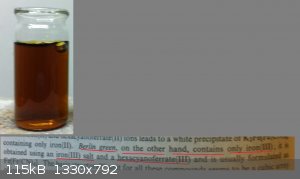
|
|
|
Sulaiman
International Hazard
    
Posts: 3724
Registered: 8-2-2015
Location: 3rd rock from the sun
Member Is Offline
|
|
fantastic link, thanks ... just spent a couple of hours there 
CAUTION : Hobby Chemist, not Professional or even Amateur
|
|
|
The Volatile Chemist
International Hazard
    
Posts: 1981
Registered: 22-3-2014
Location: 'Stil' in the lab...
Member Is Offline
Mood: Copious
|
|
Quote: Originally posted by fluorescence  | So I tried making "Berlin Green" after I found a good explanation in an old book last week...well the result is not so green to me....
|
Usually works fine for me. How concentrated are your starting solutions, and which did you pour into which?
|
|
|
Amos
International Hazard
    
Posts: 1406
Registered: 25-3-2014
Location: Yes
Member Is Offline
Mood: No
|
|
Some big boys
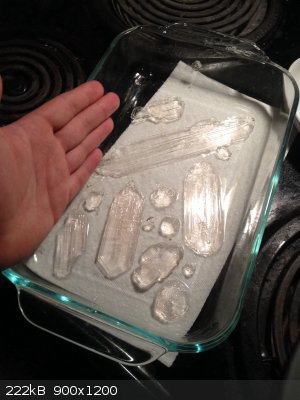
It's simply sodium sulfate that I got as a byproduct of making basic copper carbonate.
|
|
|
crystal grower
Hazard to Others
  
Posts: 474
Registered: 3-1-2016
Location: Os Petrosum
Member Is Offline
Mood: Puzzled
|
|
Quote: Originally posted by Amos  | Some big boys
It's simply sodium sulfate that I got as a byproduct of making basic copper carbonate. |
Sodium sulfate forms really amazing crystals. Unfortunately, I have no way to preserve them long-term.
[Edited on 21-12-2016 by crystal grower]
|
|
|
Velzee
Hazard to Others
  
Posts: 381
Registered: 19-8-2015
Location: New York
Member Is Offline
Mood: Taking it easy
|
|
Quote: Originally posted by Amos  | Some big boys
It's simply sodium sulfate that I got as a byproduct of making basic copper carbonate. |
That's crazy
Check out the ScienceMadness Wiki: http://www.sciencemadness.org/smwiki/index.php/Main_Page
"All truth passes through three stages. First, it is ridiculed. Second, it is violently opposed. Third, it is accepted as being self-evident."
—Arthur Schopenhauer
"¡Vivá Cristo Rey!"
—Saint José Sánchez del Río |
|
|
m1tanker78
National Hazard
   
Posts: 685
Registered: 5-1-2011
Member Is Offline
Mood: No Mood
|
|
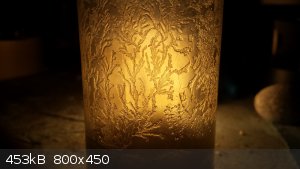
I was about to toss this in the garbage can when these crystalline vines caught my eye. This was some leftover saturated sodium silicate that sat on
the shelf for around a year.
Chemical CURIOSITY KILLED THE CATalyst.
|
|
|
awlb2
Harmless

Posts: 27
Registered: 21-11-2016
Member Is Offline
Mood: No Mood
|
|
Needle-shaped calcium benzoate crystals, produced by reaction between saturated CaCl2 solution and saturated
C6H5COONa solution. After one night these crystals fell out of solution due to low solubility.
 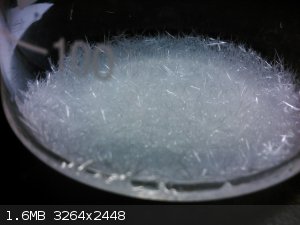
|
|
|
Brain&Force
Hazard to Lanthanides
    
Posts: 1302
Registered: 13-11-2013
Location: UW-Madison
Member Is Offline
Mood: Incommensurately modulated
|
|
A WHOLE FUCKING KILOGRAM OF EUROPIUM METAL.
<img src="http://i.imgur.com/M3OZCbg.jpg" width=800>
99.9%, stored in a glovebox. Sadly the storage was improper and thus it corroded. But who cares, we have a kilo of europium!
At the end of the day, simulating atoms doesn't beat working with the real things...
|
|
|
Ozone
International Hazard
    
Posts: 1269
Registered: 28-7-2005
Location: Good Olde USA
Member Is Offline
Mood: Integrated
|
|
WOW! How in the Holy Hell did you get your hands on *that*?
O3
-Anyone who never made a mistake never tried anything new.
--Albert Einstein
|
|
|
MrHomeScientist
International Hazard
    
Posts: 1806
Registered: 24-10-2010
Location: Flerovium
Member Is Offline
Mood: No Mood
|
|
Wow! You can make some expensive salts with all that. I bought 10g of Eu(NO<sub>3</sub> <sub>3</sub>*6H<sub>2</sub>O for $150 several years ago. Checking again today, it's up to $170.
Sigma sells it for $350! <sub>3</sub>*6H<sub>2</sub>O for $150 several years ago. Checking again today, it's up to $170.
Sigma sells it for $350!
|
|
|
violet sin
International Hazard
    
Posts: 1482
Registered: 2-9-2012
Location: Daydreaming of uraninite...
Member Is Offline
Mood: Good
|
|
WOW, indedd! Drooling just a little bit here. Thats one of the few I keep my eyes out looking for a deal, none good enough for my broke arse yet
congrats, it's a pleasure just to see that much in one place
|
|
|
aga
Forum Drunkard
    
Posts: 7030
Registered: 25-3-2014
Member Is Offline
|
|
Erm, looks a lot like charcoal dunnit ?
|
|
|
Brain&Force
Hazard to Lanthanides
    
Posts: 1302
Registered: 13-11-2013
Location: UW-Madison
Member Is Offline
Mood: Incommensurately modulated
|
|
The europium isn't mine! Our lab acquired it from a Chinese supplier – much cheaper than getting it or its compounds from somewhere like
Sigma-Aldrich. (Just look at how much a kilo of europium would cost from Sigma. I'd rather shoot myself.)
It looks more like petrified wood, I'd say.
At the end of the day, simulating atoms doesn't beat working with the real things...
|
|
|
Mabus
Wiki Master
  
Posts: 238
Registered: 3-11-2013
Member Is Offline
Mood: Energetic
|
|
WHOA, that's a lot of europium there. Is the charcoal-like aspect from manufacturing? Like injection molding or something?
|
|
|
fluorescence
Hazard to Others
  
Posts: 285
Registered: 11-11-2013
Member Is Offline
Mood: So cold outside
|
|
@Marbus: Probably because Europium is an Alkali Earth Metal. Eu and Ho especially are very much at the position of Strontium with all their properties
and if you look at a picture of oxidized dentritic Strontium in comparison to Barium (which is darker) you see how similar Sr and Eu look. I'd have to
take a closer look on the crystal structure but it's probably due to the way it was cleaned, distillation or chemical transport or something similar
and then it grew in this shape.
|
|
|
NitratedKittens
Hazard to Others
  
Posts: 131
Registered: 13-4-2015
Location: In the basket with all the other kittens
Member Is Offline
Mood: Carbonated
|
|
Quote: Originally posted by fluorescence  | | @Marbus: Probably because Europium is an Alkali Earth Metal. Eu and Ho especially are very much at the position of Strontium with all their properties
and if you look at a picture of oxidized dentritic Strontium in comparison to Barium (which is darker) you see how similar Sr and Eu look. I'd have to
take a closer look on the crystal structure but it's probably due to the way it was cleaned, distillation or chemical transport or something similar
and then it grew in this shape. |
Europium is a rare earth metal, not alkali
Basket of kittens for you ........BOOM
|
|
|
Tsjerk
International Hazard
    
Posts: 3032
Registered: 20-4-2005
Location: Netherlands
Member Is Offline
Mood: Mood
|
|
Electron wise it is an earth alkali metal.
|
|
|
DraconicAcid
International Hazard
    
Posts: 4357
Registered: 1-2-2013
Location: The tiniest college campus ever....
Member Is Offline
Mood: Semi-victorious.
|
|
The partially filled f subshell says otherwise.
Please remember: "Filtrate" is not a verb.
Write up your lab reports the way your instructor wants them, not the way your ex-instructor wants them.
|
|
|
fluorescence
Hazard to Others
  
Posts: 285
Registered: 11-11-2013
Member Is Offline
Mood: So cold outside
|
|
f-Orbitals don't really play a role for Eu(II), especially as Eu(II) has a quite stable config. with its f7. The electrons you work with are the 6s
electrons. In a similar way Y(III) is pretty much the same as Ho(III). I worked a lot with both of them in my thesis and the crystal structures my
compounds had were always pretty much the same for Y(III) and Ho(III) but different for Dy(III) and Er(III). I never worked with Eu(II) as my
compounds required RE-Metal(III) but a colleague from our research group did a lot of Alkali Earth Silicate systems where he also used Eu(II) instead
of for example Calcium or Strontium.
On the other hand the Alkali Earth Elements seem to crystallize in a different lattice than Eu does so I guess the structure is more or less due to
the way it was processed.
[Edited on 31-12-2016 by fluorescence]
|
|
|
fluorescence
Hazard to Others
  
Posts: 285
Registered: 11-11-2013
Member Is Offline
Mood: So cold outside
|
|
Forgot to bring in the acetic acid but really needed some today. So I scratched it out of the bottle to yield these nice transparent plates.
Looks really nice.
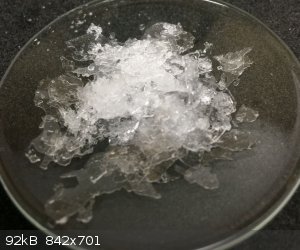
|
|
|
Geocachmaster
Hazard to Others
  
Posts: 146
Registered: 5-3-2016
Location: Maine, USA
Member Is Offline
Mood: Corroded, just like my spatulas
|
|
An hour and a half of crystallizing later and there are some long, beautiful crystals of salicylic acid, the camera doesn't do it justice. They are
each 3-7 cm long.
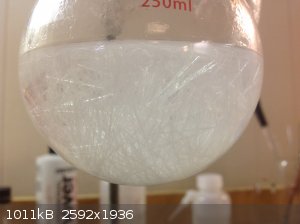
|
|
|
fluorescence
Hazard to Others
  
Posts: 285
Registered: 11-11-2013
Member Is Offline
Mood: So cold outside
|
|
@Geocachmaster: Wow that looks really cool. I have some Salicylic Acid from the Merck Reagent series and it's a fine, clumpy powder, like flour.
Really interesting how dramatically the shape can change.
|
|
|
| Pages:
1
..
51
52
53
54
55
..
77 |